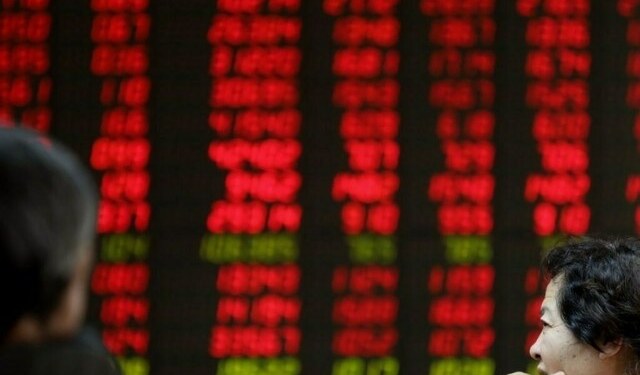MILAN: European shares hit their lowest level since August 2017 on Tuesday as a global sell-off in equities deepened and volatility spiked on growing worries over inflation and rising bond yields.
All sectoral indexes were trading in negative territory, pushing the pan-European STOXX 600 index to fall for the seventh straight session, down as much as 3.2 percent, while the euro STOXX volatility hit a 10-month high.
The STOXX index recovered some ground and was down 1.8 percent by 1002 GMT, as confidence in the region’s economic recovery partly offset concerns about the rising volatility.
“Price action is clearly driven by technical factors, tied to a brutal awakening of stock volatility,” said Alessandro Balsotti, head of asset management at JCI Capital Ltd.
“Ultimately I think the robust economic phase will be able to withstand the bloodshed on volatility,” he added.
Wall Street fell around 4 percent on Monday, as investors grappled with rising bond yields and potentially firming inflation, although futures pointed to a rebound on Tuesday.
The sell-off followed a stronger than expected jobs report in the US last week that fuelled worries over inflation and concerns the Federal Reserve will raise rates at a faster pace than expected.
Although the steep declines on Wall Street from record highs spilled over to other markets, some investors believe European equities could outperform the United States as the region’s economic and monetary policy cycles are at a less mature phase.
“It seems that the much-heralded interest rate rise has finally started. This is justified in the United States… but it is less justified in the euro zone, where interest rate levels seem excessive,” Natixis strategists said.
“This correction is a buying opportunity,” they added.
After a strong 2017, European shares rallied in January to reach their highest level in around 2 years on expectations that economic growth would boost company profits. February’s pull back has pushed the STOXX 600 7 percent below the January peak.
Among the top fallers on Tuesday were Ocado, down 6.6 percent, after the British online supermarket missed forecasts with flat full-year core earnings, while Babcock declined 2 percent after lowering its revenue forecasts.
Among the biggest sectoral fallers were banks and auto stocks which had benefited the most from the rally seen at the start of the year.
Among the few stocks in positive territory, AMS jumped 12.2 percent after the chipmaker reported a surge in fourth-quarter profit as the Austria-based group benefited from rising demand for the sensors it makes for smartphone producers such as Apple.
Intesa Sanpaolo rose 1.7 percent after Italy’s biggest retail bank pledged to halve its soured loans and grow revenue strongly while cutting costs under a new four-year plan. Traders said the market welcomed Intesa’s dividend plans.
Elsewhere, BP and BNP Paribas were lower after their earning updates.
Source: Brecorder.com



























